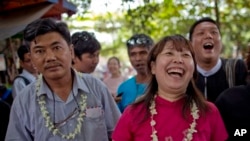Burma, also known as Myanmar, has released 41 political prisoners, in the latest step towards fulfilling President Thein Sein's promise to free all political detainees by the end of the year.
Officials say the majority of those freed Wednesday were activists charged under a peaceful assembly law (Article 18) that sets a maximum one-year prison term for people who protest without permission.
But even after the latest round of releases, a few dozen political prisoners remain jailed in Burma, which is trying to recover from decades of military dictatorship.
Bo Kyi, a member of government-backed Political Prisoners Review Committee, says there are 44 political prisoners left.
"They all are serving their sentences and there are many others facing trials as well. Nearly 200 people are facing trial under Article 18 [the Peaceful Assembly law]," said Bo Kyi.
Initial reports said some of those freed were only recently detained under a new protest law that rights groups have described as oppressive. Others are said to be connected to Burma's decades-old ethnic conflicts.
Some activists have questioned the government's motives for releasing the prisoners.
Di Nyein Lin, who was released Wednesday from Rangoon’s Insein prison, says that the releases are only aimed at promoting the appearance of reform.
“We view that it’s just a political plot to show the international community a better image by releasing us at such a time," said Lin.
Wednesday's announcement came as foreign dignitaries gathered in Burma for the start of the Southeast Asian Games.
Hundreds of political prisoners have been freed in a wave of amnesties ordered by Burma's reformist, but still military-dominated, government. Many of the releases have come during or just before key international moments.
During a visit to London in July, President Thein Sein promised to free all political prisoners by the end of the year. Critics have called for him to act immediately, saying the dissidents should not be used to win concessions from the West.
Some rights groups also fear he may soon have more prisoners to allegedly use as bargaining chips.
The Assistance Association for Political Prisoners says that in addition to those political detainees in prison, another 230 people face charges over their political activities.
The arbitrary jailing of political opponents was a hallmark of Burma's military rulers, which ruled for five decades until 2011.
In addition to the prisoner releases, Burma's new government has relaxed media censorship and allowed opposition leader Aung San Suu Kyi to successfully run for parliament.
The reforms have won praise from Western governments, many of which have loosened economic sanctions against the Southeast Asian country.
This report was produced in collaboration with the VOA Burmese service.
Officials say the majority of those freed Wednesday were activists charged under a peaceful assembly law (Article 18) that sets a maximum one-year prison term for people who protest without permission.
But even after the latest round of releases, a few dozen political prisoners remain jailed in Burma, which is trying to recover from decades of military dictatorship.
Bo Kyi, a member of government-backed Political Prisoners Review Committee, says there are 44 political prisoners left.
"They all are serving their sentences and there are many others facing trials as well. Nearly 200 people are facing trial under Article 18 [the Peaceful Assembly law]," said Bo Kyi.
Initial reports said some of those freed were only recently detained under a new protest law that rights groups have described as oppressive. Others are said to be connected to Burma's decades-old ethnic conflicts.
Some activists have questioned the government's motives for releasing the prisoners.
Di Nyein Lin, who was released Wednesday from Rangoon’s Insein prison, says that the releases are only aimed at promoting the appearance of reform.
“We view that it’s just a political plot to show the international community a better image by releasing us at such a time," said Lin.
Wednesday's announcement came as foreign dignitaries gathered in Burma for the start of the Southeast Asian Games.
Hundreds of political prisoners have been freed in a wave of amnesties ordered by Burma's reformist, but still military-dominated, government. Many of the releases have come during or just before key international moments.
During a visit to London in July, President Thein Sein promised to free all political prisoners by the end of the year. Critics have called for him to act immediately, saying the dissidents should not be used to win concessions from the West.
Some rights groups also fear he may soon have more prisoners to allegedly use as bargaining chips.
The Assistance Association for Political Prisoners says that in addition to those political detainees in prison, another 230 people face charges over their political activities.
The arbitrary jailing of political opponents was a hallmark of Burma's military rulers, which ruled for five decades until 2011.
In addition to the prisoner releases, Burma's new government has relaxed media censorship and allowed opposition leader Aung San Suu Kyi to successfully run for parliament.
The reforms have won praise from Western governments, many of which have loosened economic sanctions against the Southeast Asian country.
This report was produced in collaboration with the VOA Burmese service.





